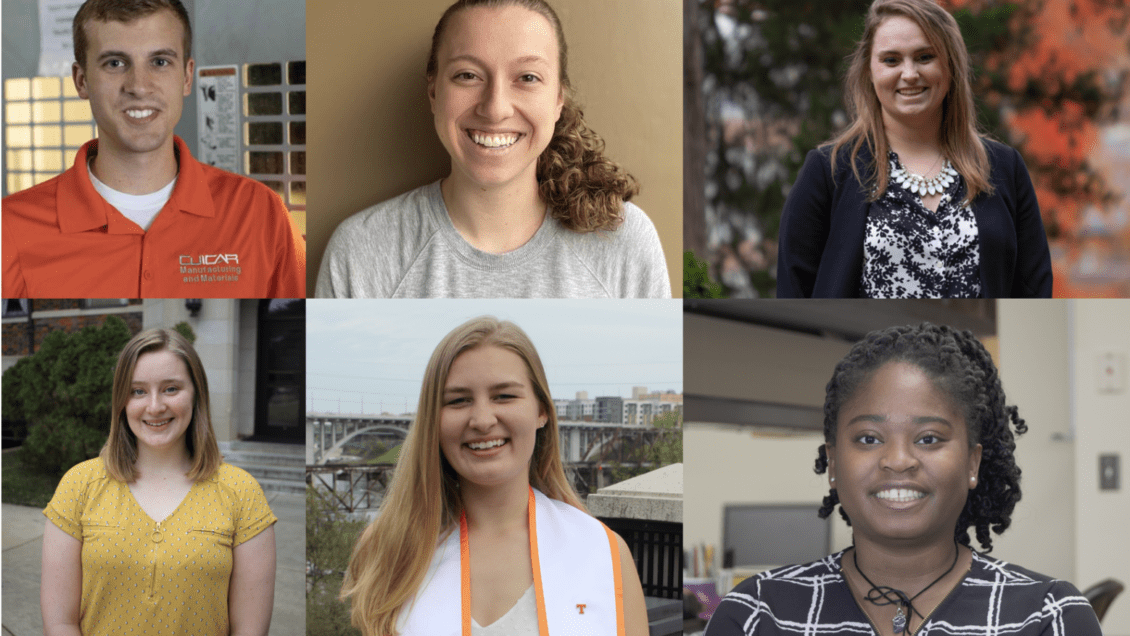Three Clemson University seniors and four graduate students received Graduate Research Fellowships from the National Science Foundation, a highly competitive grant aimed at building tomorrow’s scientific and engineering leaders. The fellowship provides three years of support for the graduate education of recipients, including a $34,000 annual stipend and a $12,000 cost-of-education allowance. Fellows have access to a wide range of professional development opportunities over the course of their graduate careers.
The fellowship program, the oldest of its kind, helps to ensure the vitality and diversity of the scientific and engineering workforce, recognizing and supporting outstanding graduate students who are pursuing full-time research-based master’s and doctoral degrees in science, technology, engineering and mathematics (STEM) fields. The highly competitive program has an annual acceptance rate of approximately 16 percent, from among more than 12,000 applicants. The National Science Foundation evaluates students in their fields of study on the basis of intellectual merit and broader impacts.
“The work of these students is a testament to their dedication and the importance the University places on research,” said Robert H. Jones, Clemson’s executive vice president for academic affairs and provost. “We are proud of their efforts and look forward to watching as they make a positive impact with research and leadership in their fields.”
The six recipients are Margaret Elpers, Tyler Grimm, Britney Hudson, Allison Kaczmarek, Laura McCann and Megan Pitz.
Laura McCann, College of Science
McCann is a senior majoring in chemistry. Throughout her time at Clemson, she has been involved in a number of research projects, which helped her determine her preferred field of study – nuclear chemistry. She is also a 2019 recipient of the Barry M. Goldwater Scholarship, a premier national undergraduate award for the fields of mathematics, natural sciences and engineering. McCann envisions working at a national laboratory exploring the structural properties of the nucleus, the chemistry of radioactive elements and the overall chemistry of heavy elements. After graduation in May, McCann will pursue her doctoral studies in nuclear chemistry at Texas A&M University.
Megan Pitz, College of Engineering, Computing and Applied Sciences
Pitz is a doctoral student in the bioengineering department. Her studies focus on local drug and RNAi delivery methods for glioblastoma multiforme. Pitz works in the Nanobiotechnology Lab, where she is developing a peptide-based delivery system for chemotherapy and gene therapy for treatment of glioblastoma multiforme. Upon completion of her Ph.D. she plans to pursue a career involving a combination of research, scientific communication, and public policy.
Margaret Elpers, College of Engineering, Computing and Applied Sciences
Elpers is a senior bioengineering and biomedical engineering major. During her time at Clemson, she has been involved in a number of research projects, as well as serving as an undergraduate researcher in the Clemson Bioengineering Nanobiotechnology Lab. Elpers will pursue her Ph.D. at Cornell University in biomedical engineering.
Tyler Grimm, College of Engineering, Computing and Applied Sciences
Grimm is a doctoral student in the automotive engineering program. His research focuses on incremental forming, machining freeform surfaces and joining through friction element welding. Grimm aims to improve advanced manufacturing processes for rapid implementation into domestic industries.
Britney Hudson, College of Engineering, Computing and Applied Sciences
Hudson is a doctoral student in the bioengineering department. Her current research goals involve exploring the role of chemical and mechanical stimuli in bladder dysfunction.
Allison Kaczmarek, College of Science and College of Engineering, Computing and Applied Sciences
Kaczmarek is a senior dual-enrolled in materials science and engineering, and chemistry. During her time at Clemson she served as President of the College of Engineering, Computing and Applied Sciences Student Advisory Board. She also served as an undergraduate researcher on several projects. Kaczmarek will pursue her doctoral studies at the Massachusetts Institute of Technology with a focus on materials science and engineering.
Kelli McCourt, College of Engineering, Computing and Applied Sciences
McCourt is a first-year graduate student in biosystems engineering, working on her doctorate. She completed her undergraduate work at the University of Florida where her research primarily focused on precision agriculture and sensor development for public health. She is working with Diana Vanegas, an assistant professor of biosystems engineering in the Department of Environmental Engineering and Earth Sciences. McCourt’s research is geared to developing low cost sensors, user interfaces, and data analytics tools. After earning her doctorate McCourt plans to continue her research at a national laboratory or as a professor in academia.
In addition, five undergraduate students and one graduate student received Honorable Mention from the National Science Foundation – Daniel Custer, Charles Dove, Erin Mihealsick, Travis Roberts, Erin Shappell and Jillian Walton. The undergraduates are eligible to apply for the Graduate Research Fellowship again for the 2021-2022 school year.
Two Clemson alumni also received the Graduate Research Fellowship: Diana Burden (Mechanical Engineering) and Emma Dixon (Computer Science). Four alumni received Honorable Mention: Selena Hess (Microbial Biology), Madeline Blakenship (Biomedical Engineering), Crystal Pee (STEM Education) and Kristyn Robinson (Cell Biology).
Students interested in the NSF Graduate Research Fellowship or other nationally competitive programs should contact the Office of Major Fellowships at 864-656-9704 or fellowships@clemson.edu.
Get in touch and we will connect you with the author or another expert.
Or email us at news@clemson.edu








